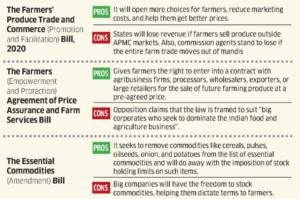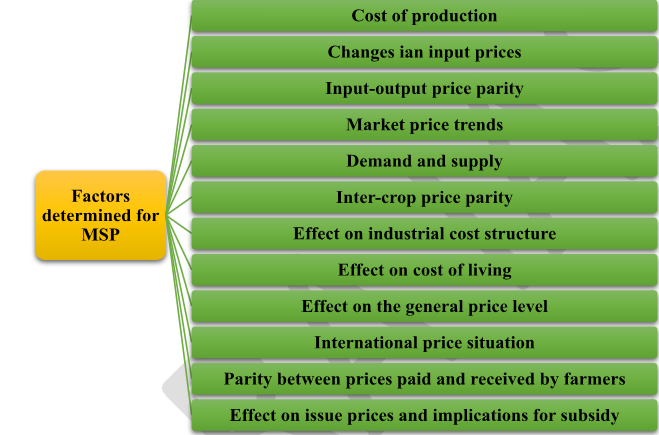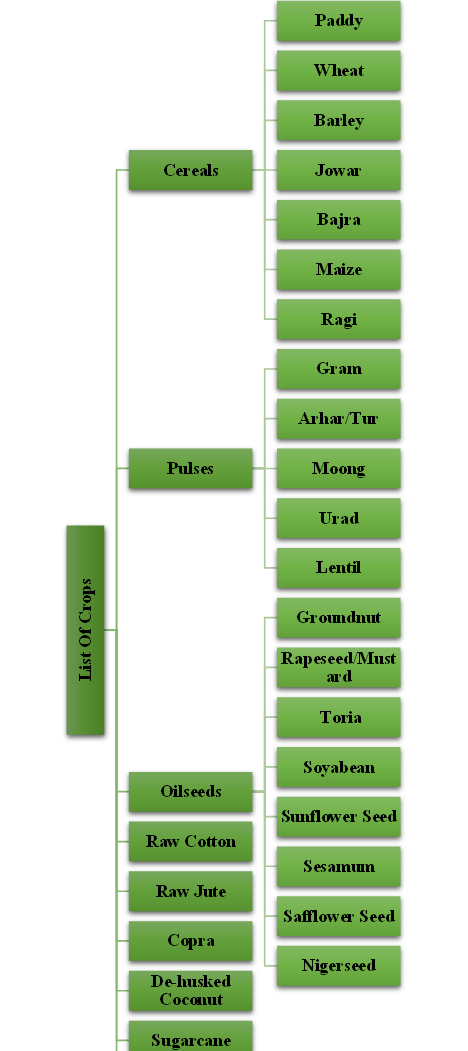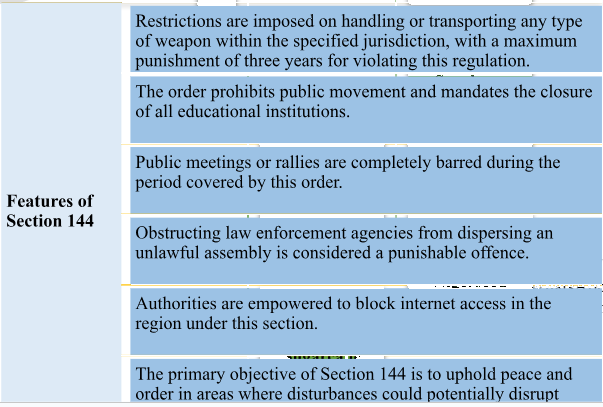Why in News?
Nearly two years after farmers, mainly from Punjab, Haryana and Western Uttar Pradesh laid siege to Delhi to protest against three farm laws, farmers are again marching to Delhi. Expecting another siege of Delhi, the police in Haryana as well as Delhi have put in place massive security arrangements and sealed borders between Punjab and Haryana and Haryana and Delhi to deter farmers from entering the national capital.
Key Demands of Farmers
-
- Guarantee Minimum Support Price (MSP) for all crops and determine crop prices based on the Dr M S Swaminathan Commission’s report
- Swaminathan Commission recommends raising MSP to at least 50% more than the weighted average cost of production (C2+ 50% formula)
- C2 formula includes imputed cost of capital and rent on land to ensure 50% returns for farmers
- Imputed cost accounts for opportunity cost of using resources like land, labour, and capital
- Imputed cost of capital factors in the interest or returns that could have been earned if capital was invested elsewhere
- Additional demands
- Full debt waiver for farmers and labourers
- Implementation of the Land Acquisition Act of 2013 with provisions for farmers’ written consent and compensation at four times the collector rate
- Collector rate is the minimum property value for registration, preventing undervaluation and tax evasion
- Punishment for perpetrators of the October 2021 Lakhimpur Kheri killings
- Withdrawal from the World Trade Organization (WTO) and freezing of all free trade agreements (FTAs)
- Pensions for farmers and farm labourers
- Compensation for farmers who died during the 2020 Delhi protest, including job placement for one family member
- Scrapping of the Electricity Amendment Bill 2020
- Increase MGNREGA employment to 200 days per year, set daily wage at Rs 700, and link the scheme with farming
- Strict penalties and fines on companies producing fake seeds, pesticides, fertilisers, along with improvements in seed quality
- Establishment of a national commission for spices such as chilli and turmeric
- Ensure the rights of indigenous peoples over water, forests, and land.

MS Swaminathan Committee
The late MS Swaminathan, celebrated as the ‘Father of India’s Green Revolution’ and recently honored with the Bharat Ratna, chaired the National Commission on Farmers (NCF). The NCF made several key recommendations, including:
Adoption of the C2+50 percent formula for Minimum Support Price (MSP), ensuring MSP is at least 50 percent more than the weighted average cost of production.
Inclusion of ‘Agriculture’ in the Concurrent List of the country’s Constitution, a recommendation aimed at enhancing governance in the agricultural sector.
Opposition to the diversion of ‘prime’ agricultural land and forest to the corporate sector for non-agricultural purposes, emphasizing the preservation of vital resources.
Advocacy for increased investment in agriculture-related infrastructure and improved credit availability for farmers to support their agricultural activities.
Promotion of conservation farming practices, aligning with sustainable and environmentally friendly agricultural approaches.
 Background of Farmers Protest 2024
Background of Farmers Protest 2024
In 2020, the government introduced three farm laws. Farmers were protesting against these laws.
Farm Laws Introduced in 2020
- Farmers’ Produce Trade and Commerce (Promotion and Facilitation) Act: Allows farmers to sell produce outside Agriculture Produce Market Committees (APMCs).
- Farmers (Empowerment and Protection) Agreement of Price Assurance and Farm Services Act: Permits contract farming and free marketing of produce.
- Essential Commodities (Amendment) Act: Excludes certain items from trade regulation, except in crisis situations.
Concerns of Farmers

Farmers Protests
- Unprecedented protests at Delhi borders persisted for over a year.
- The laws were eventually withdrawn in 2021.
- Farmers have now resumed their protests.
Government’s Response
Repeal of Farm Laws: In November 2021, the Indian Government repealed the controversial three farm laws.
Formation of MSP Committee: Following the repeal, the government announced the formation of a committee on Minimum Support Price (MSP) in July 2022.
- The committee’s objectives include discussing MSP, promoting zero-budget natural farming, and deciding on cropping patterns.
Recent Development – New Committee Proposal: In a recent meeting between Cabinet ministers and farmer union leaders, the government proposed the creation of a new committee.
- This committee would include representatives from agriculture, rural, and animal husbandry ministries.
- The new committee aims to address farmers’ demands for MSP for all crops.
- The government has pledged that the new committee will convene regularly and operate within a defined timeframe, demonstrating its commitment to addressing farmers’ concerns in a timely manner.
Constitutional Provisions related to Right to Protest
The Indian Constitution safeguards the right to protesteacefully through specific provisions. Article 19(1)(a) ensures the freedom of speech and expression, while Article 19(1)(b) guarantees citizens the right to assemble peaceably and without arms.
However, Article 19(2) imposes reasonable restrictions on the right to assemble peaceably and without arms. These limitations are imposed in the interests of the sovereignty and integrity of India, the security of the State, friendly relations with foreign States, public order, decency, or morality. Additionally, restrictions may be applied in cases related to contempt of court, defamation, or incitement to an offence.
In the case of Ramlila Maidan Incident v. Home Secretary, Union Of India & Ors. (2012), the Supreme Court emphasized that citizens possess a fundamental right to assembly and peaceful protest, which cannot be deprived by arbitrary executive or legislative actions.
Understanding Minimum Support Price (MSP)
MSP is the guaranteed amount paid to farmers when the government purchases their produce.
Determined based on recommendations from the Commission for Agricultural Costs and Prices (CACP).
Objectives: Aims to ensure remunerative prices for farmers and encourages crop diversification.
Determination of MSP
Factors Considered: The Commission considers various factors in formulating recommendations for minimum support prices (MSP) and other non-price measures.
Commission for Agricultural Costs and Prices (CACP)
CACP considers factors such as cost of production, demand and supply, market price trends, and inter-crop pricparity.
The Commission for Agricultural Costs and Prices (CACP) is an attached office of the Ministry of Agriculture and Farmers Welfare, established in January
Determination of MSP
Factors Considered: The Commission considers various factors in formulating recommendations for minimum support prices (MSP) and other non-price measures.

Data Used by the Commission: The Commission utilizes micro-level data and aggregates at the district, state, and national levels. The following data is used by the commission:
- Cost of cultivation per hectare and structure of costs in different regions
- Cost of production per quintal in various regions
- Prices of inputs and changes
- Market prices of products and changes
- Prices of commodities sold and purchased by farmers
- Supply-related information – area, yield, production, imports, exports, domestic availability, and stocks
- Demand-related information – total and per capita consumption, processing industry capacity
- Prices in the international market and changes
- Prices of derivatives of farm products and changes
- Cost of processing agricultural products and changes
- Cost of marketing – storage, transportation, processing, marketing services, taxes/fees, and margins retained by market functionaries
- Macro-economic variables like general price levels, consumer price indices, and factors reflecting monetary and fiscal aspects.
MSP Increase for Kharif Crops
- The increase in MSP for Kharif Crops aligns with the Union Budget 2018-19 announcement.
- The goal is to fix MSPs at a level of at least 1.5 times the All-India weighted average Cost of Production (CoP), aiming for reasonably fair remuneration for farmers.
Crops Under MSP: CACP recommends MSPs for 22 mandated crops and fair and remunerative price (FRP) for sugarcane.
- Mandated crops include 14 kharif crops, 6 rabi crops, and 2 other commercial crops.
Three Types of Production Cost: CACP projects three kinds of production cost:
- ‘A2’: All paid-out costs directly incurred by the farmer.
- ‘A2+FL’: Includes A2 plus an imputed value of unpaid family labour.
- ‘C2’: Comprehensive cost including rentals and interest for owned land and fixed capital assets.
Cost Consideration for MSP: CACP considers both ‘A2+FL’ and ‘C2’ costs while recommending MSP.
Only ‘A2+FL’ cost is considered for return, while ‘C2’ costs serve as benchmark reference costs.
Need for MSP: Evolved due to the following challenges faced by farmers:
- Twin droughts of 2014 and 2015.
- Shocks of Demonetisation and the Rollout of GST.
- Economic slowdown post-2016-17 and the impact of the pandemic.
- Addresses higher input prices and ensures fair income for farmers.
- Crucial in states where agriculture is a major source of livelihood to reduce farm distress and poverty.
Section 144 and Protests
Prohibitory orders under Section 144 of the Criminal Procedure Code (CrPC) have been enforced in the entire Delhi, banning large gatherings, ahead of the farmers’ proposed ‘Delhi Chalo’ march to maintain law and order, said Delhi Police commissioner Sanjay Arora on Monday.

About Section 144 CrPC
- This law grants authority to the magistrate of any state or union territory in India to issue an order prohibiting the gathering of four or more people in a specified area.
- It is applied in urgent cases of nuisance or anticipated danger that has the potential to cause trouble or damage to human life or property.
- The order under Section 144 can be directed towards a specific individual or the general public.

Duration of Section 144 Order
- No order under Section 144 can remain in force for more than 2 months.
- Under the discretion of the state government, the validity can be extended for an additional two months, with the maximum validity extendable to six months.
- Once the situation returns to normal, the imposed Section 144 can be withdrawn.
Way Forward

Crop Diversification
- Gradually expand the list of crops eligible for Minimum Support Price (MSP) support.
- Provide farmers with a wider range of choices for cultivation aligned with market demand.
- Reduce the dominance of rice and wheat through diversified crop options.
Targeted MSPs
- Focus on setting MSPs for crops crucial for food security and impactful on farmer livelihoods.
- Avoid providing MSP for all crops across all regions.
- Implement a targeted approach to optimize resource allocation.
Procurement Mechanisms
- Improve and modernize procurement mechanisms to ensure farmer access to MSPs.
- Enhance efficiency in procurement systems to streamline the process.
- Reduce reliance on middlemen and explore direct procurement methods.
- Expand the reach of procurement agencies to cover more farmers and regions.

 MPSC राज्य सेवा – 2025
MPSC राज्य सेवा – 2025
